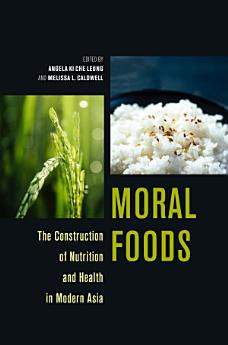Moral Foods: The Construction of Nutrition and Health in Modern Asia
Angela Ki Che Leung · Melissa L. Caldwell · Robert Ji-Song Ku · Christine R. Yano
Feb 2020 · University of Hawaii Press
Ebook
356
Pages
family_home
Eligible
info
reportRatings and reviews aren’t verified Learn More
About this ebook
Moral Foods: The Construction of Nutrition and Health in Modern Asia investigates how foods came to be established as moral entities, how moral food regimes reveal emerging systems of knowledge and enforcement, and how these developments have contributed to new Asian nutritional knowledge regimes. The collection’s focus on cross-cultural and transhistorical comparisons across Asia brings into view a broad spectrum of modern Asia that extends from East Asia, Southeast Asia, to South Asia, as well as into global communities of Western knowledge, practice, and power outside Asia.
The first section, “Good Foods,” focuses on how food norms and rules have been established in modern Asia. Ideas about good foods and good bodies shift at different moments, in some cases privileging local foods and knowledge systems, and in other cases privileging foreign foods and knowledge systems. The second section, “Bad Foods,” focuses on what makes foods bad and even dangerous. Bad foods are not simply unpleasant or undesirable for aesthetic or sensory reasons, but they can hinder the stability and development of persons and societies. Bad foods are symbolically polluting, as in the case of foreign foods that threaten not only traditional foods, but also the stability and strength of the nation and its people. The third section, “Moral Foods,” focuses on how themes of good versus bad are embedded in projects to make modern persons, subjects, and states, with specific attention to the ambiguities and malleability of foods and health. The malleability of moral foods provides unique opportunities for understanding Asian societies’ dynamic position within larger global flows, connections, and disconnections.
Collectively, the chapters raise intriguing questions about how foods and the bodies that consume them have been valued politically, economically, culturally, and morally, and about how those values originated and evolved. Consumers in modern Asia are not simply eating to satisfy personal desires or physiological needs, but they are also conscripted into national and global statemaking projects through acts of ingestion. Eating, then, has become about fortifying both the person and the nation.
The first section, “Good Foods,” focuses on how food norms and rules have been established in modern Asia. Ideas about good foods and good bodies shift at different moments, in some cases privileging local foods and knowledge systems, and in other cases privileging foreign foods and knowledge systems. The second section, “Bad Foods,” focuses on what makes foods bad and even dangerous. Bad foods are not simply unpleasant or undesirable for aesthetic or sensory reasons, but they can hinder the stability and development of persons and societies. Bad foods are symbolically polluting, as in the case of foreign foods that threaten not only traditional foods, but also the stability and strength of the nation and its people. The third section, “Moral Foods,” focuses on how themes of good versus bad are embedded in projects to make modern persons, subjects, and states, with specific attention to the ambiguities and malleability of foods and health. The malleability of moral foods provides unique opportunities for understanding Asian societies’ dynamic position within larger global flows, connections, and disconnections.
Collectively, the chapters raise intriguing questions about how foods and the bodies that consume them have been valued politically, economically, culturally, and morally, and about how those values originated and evolved. Consumers in modern Asia are not simply eating to satisfy personal desires or physiological needs, but they are also conscripted into national and global statemaking projects through acts of ingestion. Eating, then, has become about fortifying both the person and the nation.
About the author
Angela Ki Che Leung (Editor)
Angela Ki Che Leung is director of the Hong Kong Institute for the Humanities and Social Sciences, Chair Professor of History, and Joseph Needham-Philip Mao Professor at the University of Hong Kong.
Melissa L. Caldwell (Editor)
Melissa L. Caldwell is professor of anthropology at the University of California, Santa Cruz, and former editor of Gastronomica: The Journal of Critical Food Studies.
Angela Ki Che Leung is director of the Hong Kong Institute for the Humanities and Social Sciences, Chair Professor of History, and Joseph Needham-Philip Mao Professor at the University of Hong Kong.
Melissa L. Caldwell (Editor)
Melissa L. Caldwell is professor of anthropology at the University of California, Santa Cruz, and former editor of Gastronomica: The Journal of Critical Food Studies.
Rate this ebook
Tell us what you think.
Reading information
Smartphones and tablets
Install the Google Play Books app for Android and iPad/iPhone. It syncs automatically with your account and allows you to read online or offline wherever you are.
Laptops and computers
You can listen to audiobooks purchased on Google Play using your computer's web browser.
eReaders and other devices
To read on e-ink devices like Kobo eReaders, you'll need to download a file and transfer it to your device. Follow the detailed Help Center instructions to transfer the files to supported eReaders.





